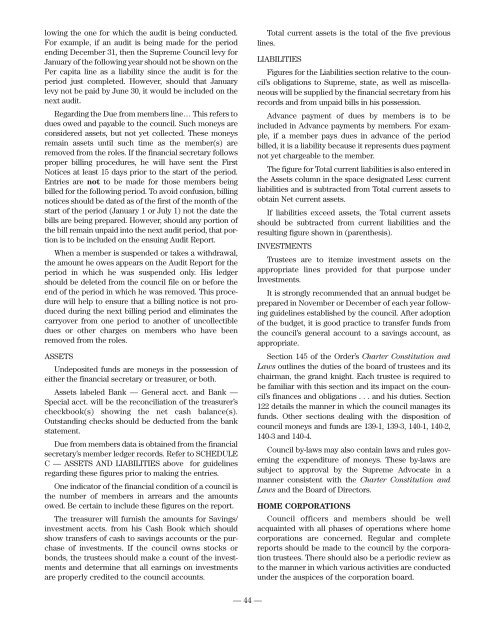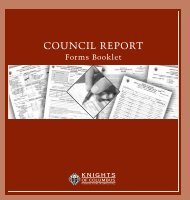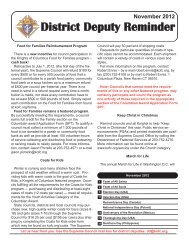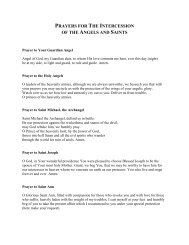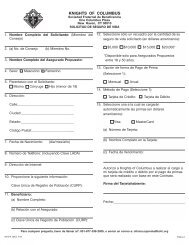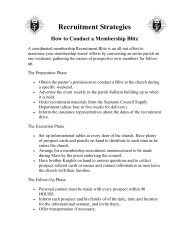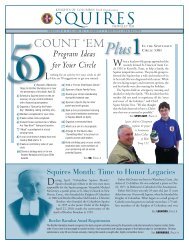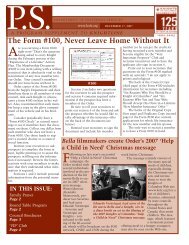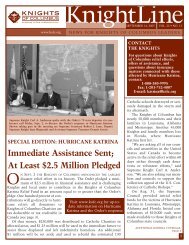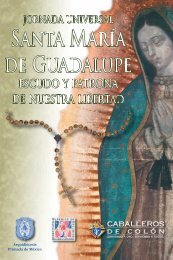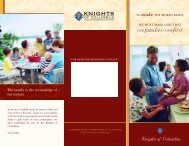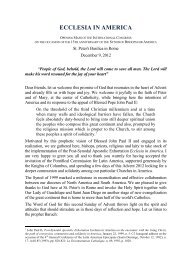Financial Secretary Handbook - Knights of Columbus, Supreme ...
Financial Secretary Handbook - Knights of Columbus, Supreme ...
Financial Secretary Handbook - Knights of Columbus, Supreme ...
You also want an ePaper? Increase the reach of your titles
YUMPU automatically turns print PDFs into web optimized ePapers that Google loves.
lowing the one for which the audit is being conducted.<br />
For example, if an audit is being made for the period<br />
ending December 31, then the <strong>Supreme</strong> Council levy for<br />
January <strong>of</strong> the following year should not be shown on the<br />
Per capita line as a liability since the audit is for the<br />
period just completed. However, should that January<br />
levy not be paid by June 30, it would be included on the<br />
next audit.<br />
Regarding the Due from members line… This refers to<br />
dues owed and payable to the council. Such moneys are<br />
considered assets, but not yet collected. These moneys<br />
remain assets until such time as the member(s) are<br />
removed from the roles. If the financial secretary follows<br />
proper billing procedures, he will have sent the First<br />
Notices at least 15 days prior to the start <strong>of</strong> the period.<br />
Entries are not to be made for those members being<br />
billed for the following period. To avoid confusion, billing<br />
notices should be dated as <strong>of</strong> the first <strong>of</strong> the month <strong>of</strong> the<br />
start <strong>of</strong> the period (January 1 or July 1) not the date the<br />
bills are being prepared. However, should any portion <strong>of</strong><br />
the bill remain unpaid into the next audit period, that portion<br />
is to be included on the ensuing Audit Report.<br />
When a member is suspended or takes a withdrawal,<br />
the amount he owes appears on the Audit Report for the<br />
period in which he was suspended only. His ledger<br />
should be deleted from the council file on or before the<br />
end <strong>of</strong> the period in which he was removed. This procedure<br />
will help to ensure that a billing notice is not produced<br />
during the next billing period and eliminates the<br />
carryover from one period to another <strong>of</strong> uncollectible<br />
dues or other charges on members who have been<br />
removed from the roles.<br />
ASSETS<br />
Undeposited funds are moneys in the pos session <strong>of</strong><br />
either the financial secretary or treas urer, or both.<br />
Assets labeled Bank — General acct. and Bank —<br />
Special acct. will be the reconciliation <strong>of</strong> the treasurer’s<br />
checkbook(s) showing the net cash balance(s).<br />
Outstanding checks should be deducted from the bank<br />
statement.<br />
Due from members data is obtained from the financial<br />
secretary’s member ledger records. Refer to SCHEDULE<br />
C — ASSETS AND LIABILITIES above for guidelines<br />
regarding these figures prior to making the entries.<br />
One indicator <strong>of</strong> the financial condition <strong>of</strong> a council is<br />
the number <strong>of</strong> members in arrears and the amounts<br />
owed. Be certain to include these figures on the report.<br />
The treasurer will furnish the amounts for Sav ings/<br />
investment accts. from his Cash Book which should<br />
show transfers <strong>of</strong> cash to sav ings accounts or the purchase<br />
<strong>of</strong> investments. If the council owns stocks or<br />
bonds, the trustees should make a count <strong>of</strong> the investments<br />
and determine that all earnings on investments<br />
are properly credited to the council accounts.<br />
Total current assets is the total <strong>of</strong> the five previous<br />
lines.<br />
LIABILITIES<br />
Figures for the Liabilities section relative to the coun -<br />
cil’s obligations to <strong>Supreme</strong>, state, as well as miscellaneous<br />
will be supplied by the financial secretary from his<br />
records and from unpaid bills in his possession.<br />
Advance payment <strong>of</strong> dues by members is to be<br />
included in Advance payments by members. For example,<br />
if a member pays dues in advance <strong>of</strong> the period<br />
billed, it is a liability because it represents dues payment<br />
not yet chargeable to the member.<br />
The figure for Total current liabili ties is also entered in<br />
the Assets column in the space designated Less: current<br />
liabilities and is sub tracted from Total current assets to<br />
obtain Net current assets.<br />
If liabilities exceed assets, the Total current assets<br />
should be subtracted from current liabili ties and the<br />
resulting figure shown in (parenthesis).<br />
INVESTMENTS<br />
Trustees are to itemize investment assets on the<br />
appropriate lines provided for that purpose under<br />
Investments.<br />
It is strongly recom mended that an annual budget be<br />
prepared in November or December <strong>of</strong> each year following<br />
guidelines established by the council. After adoption<br />
<strong>of</strong> the budget, it is good practice to transfer funds from<br />
the council’s general account to a savings account, as<br />
appropriate.<br />
Section 145 <strong>of</strong> the Order’s Charter Constitution and<br />
Laws outlines the duties <strong>of</strong> the board <strong>of</strong> trustees and its<br />
chairman, the grand knight. Each trustee is required to<br />
be familiar with this section and its impact on the council’s<br />
finances and obligations . . . and his duties. Section<br />
122 details the manner in which the council manages its<br />
funds. Other sections dealing with the disposition <strong>of</strong><br />
coun cil moneys and funds are 139-1, 139-3, 140-1, 140-2,<br />
140-3 and 140-4.<br />
Council by-laws may also contain laws and rules governing<br />
the expenditure <strong>of</strong> moneys. These by-laws are<br />
subject to approval by the <strong>Supreme</strong> Advocate in a<br />
manner consistent with the Charter Constitution and<br />
Laws and the Board <strong>of</strong> Directors.<br />
HOME CORPORATIONS<br />
Council <strong>of</strong>ficers and members should be well<br />
acquainted with all phases <strong>of</strong> operations where home<br />
corporations are concerned. Regular and complete<br />
reports should be made to the council by the corporation<br />
trustees. There should also be a periodic review as<br />
to the manner in which various activities are conducted<br />
under the auspices <strong>of</strong> the corporation board.<br />
— 44 —


